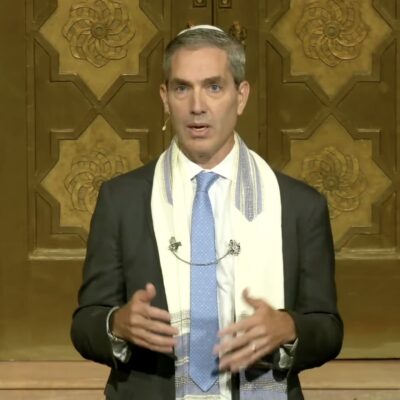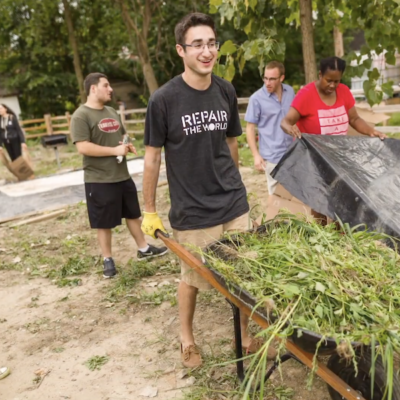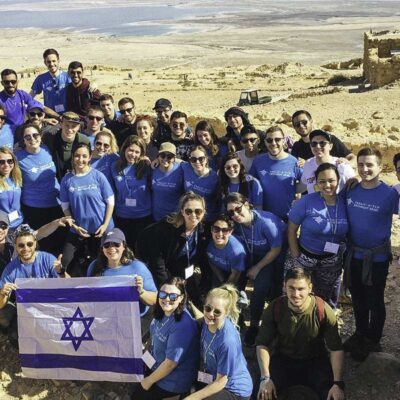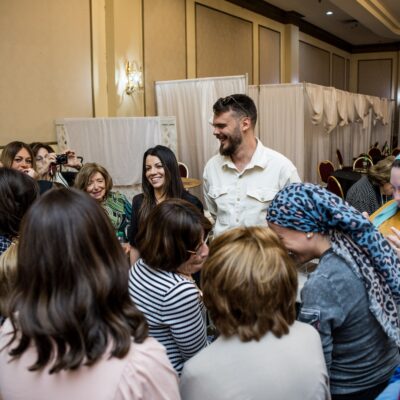Opinion
TEACHING THE JEWISH EXPERIENCE
Empowering Sephardic perspectives as we navigate antisemitism in education
On Friday, Oct. 13, just five days after the massacre in southern Israel, Qatari-based Hamas leader Khaled Meshaal called for a day of “global jihad.” Coincidentally, this day of jihad happened to fall on pajama day at my first-grader’s public school — and my son insisted on wearing Hanukkah pajamas.
My son is one of the very few Jewish kids in our San Francisco Bay Area public elementary school, and this moment served as my first lesson in cultivating Jewish pride through the art of parenting. With an emphatic yes, I encouraged him to walk confidently into his classroom, proudly exhibiting his chosen pajamas. At school drop-off, I stood nervously with my son’s grandmother, Sima, contemplating the reality of escalating threats of antisemitism in our school system and society at large.
Sima, my mother-in-law, bore the weight of Oct. 7 with profound gravity, particularly since her cousin was taken hostage in Gaza and because her entire family lives in Israel. The trauma of Oct. 7, coupled with the ominous call for global jihad, triggered recollections of the persecution inflicted by antisemitic mobs and punitive policies on the Jewish community in the city of her birth: Baghdad, Iraq.
The same antisemitic ideologies that compelled her family and a million other Jews to flee or be ethnically cleansed from the Middle East and North Africa have begun permeating our classrooms, city halls, ports, and streets, mirroring the historical echoes of Iraq and other countries in the Middle East and North Africa. Ask any Jewish individual born in Arab and Muslim countries about the adversities faced as a religious minority, and foremost will be memories of antisemitic alienation, bullying, stringent litmus tests and the imperative to either leave or be expelled from public schools in the Arab world. For numerous Jews originating from Arab and Muslim nations, the introduction of antisemitism into classrooms marked the initial signifier of their eventual ethnic cleansing.

This pattern of antisemitism within public school systems is not a remote relic of the past – it’s unfolding here and now.
Thankfully, unlike former Jewish refugees from Arab and Muslim countries, Jewish Americans are afforded civil rights protections on the basis of shared ancestry and nationality. Since Oct. 7, the U.S. Department of Education’s Office of Civil Rights (OCR) has opened 58 investigations into discrimination based on shared ancestry, with more than two-thirds of the complaints related to antisemitism. Two of the school districts under investigation are the San Francisco Unified School District (SUSD) and the Oakland Unified School District (OUSD).
How did we get here?
On Oct.18, just one week after the day of global jihad, students across the Bay Area orchestrated loud student walkouts to “Free Palestine,” unsettling classrooms and shattering the purportedly “safe” school cultures with incendiary chants. This was followed by an unauthorized Dec. 7 pro-Palestine “teach-in,” when 100 teachers brought anti-Israel instruction into their classrooms. The Oakland Teach-In Curricular Resources list, organized by members of the Oakland Education Association, encompasses over 50 lesson plans and resources with titles such as “Why Is Israel Called an Apartheid State” (middle school), “Gaza Fights for Freedom: History of Resistance” (high school), and “Decolonize Palestine.” My initial exploration of the kindergarten materials on the site led me to a YouTube video of an alphabet picture book that included, “I is for Intifada.”
It is increasingly clear here in the San Francisco Bay Area that the endeavors to infuse anti-Israel and antisemitic content into the education system are meticulously organized, insidious — and will hopefully soon be exposed by the OCR investigations.
In the Bay Area, organizations like Jewish Voice for Peace (JVP), Middle East Children’s Alliance (MECA) and Arab Resource and Organizing Center (AROC) have excelled in disseminating the fallacy to our students and educators that Israel is a settler-colonial project, negating universal Jewish indigeneity to and in the land of Israel, and ignoring the continuous presence of Jews in Israel and the Middle East for over 2,000 years. This antisemitic revisionist discourse, which JIMENA has been cautioning against for many years, exploits the naivety of those with limited knowledge about the Middle East who simply yearn for peace in the region.
By purporting to represent Arab communities in the Bay Area, organizations like AROC have secured contracts with SFUSD, most likely using their positions to introduce their political agendas into our schools, subsequently mobilizing the students they influence into action. Make no mistake: the political agenda of organizations like AROC and MECA is the destruction of the state of Israel. The CEO of AROC has publicly stated, “Bringing down Israel really will benefit everyone in the world, and everyone in society.” After Oct. 7, AROC produced a Student Walk Out for Palestine Toolkit that encouraged students to use megaphones with a menu of selected chants and posters, including slogans to “Support Palestinian Resistance.”
Currently, AROC is under contract to provide services to nine different schools within the San Francisco Unified School District.
While some may dismiss this as merely a California issue, rest assured that MECA and AROC are part of an extensive network of anti-Israel organizations and coalitions that are attempting to influence education nationwide. For instance, MECA, the Berkeley-based organization that hosts the Teach Palestine Project and AROC are both members of the Coalition of Liberated Ethnic Studies.
So, what can be done?
While U.S. Department of Education’s Office of Civil Rights investigations are crucial, and reporting is a vital step in addressing antisemitism, various proactive measures can be implemented by state legislatures, state boards of education, school districts and parents to safeguard our children:
Establishing standards for social science disciplines, such as ethnic studies, should precede class instruction. Zero-tolerance policies should apply to those educators bringing activism into teaching, akin to the incident during the Teach-In for Palestine by OUSD teachers. Districts and states should have explicit criteria and standards for engaging external activist and community-based organizations, and should also be fully transparent about proposed educational materials that have the potential to create hostile learning environments for our children.
Additionally, schools receiving federal funding should be informed that the U.S. Department of Education is committed to considering the IHRA definition of antisemitism when investigating claims. Parents can encourage schools to adopt the IHRA definition as a tool for understanding and identifying antisemitism.
As concerned parents and community members, we also have a responsibility we are currently not fully meeting. Instead of solely engaging with schools and districts when issues of antisemitism arise, we should be far more proactive by building trusting relationships with them and offering to collaborate and educate. It is essential to find ways to empower and enable Jewish parents to actively participate on school boards and city councils, fostering renewed Jewish engagement in civic life. Therefore, we need mechanisms to train members of our community in how to get engaged in civic life.
On a deeper level, as Jews, it is our responsibility to understand Jewish history and recognize that the conflict and antisemitism currently experienced in the U.S. are not new to a significant portion of the Jewish American community.
We must collectively commit ourselves to broadening our understanding of antisemitism education and activism beyond the Holocaust and oppression in Eastern Europe. In order for us to navigate the current rise of antisemitism happening not only here but around the globe, it is critical for Jewish organizations to learn about and internalize the histories and experiences of the one million Jewish refugees from North Africa and the Middle East and apply those lessons to every element of our work to combat antisemitism in the school system and beyond. There is incredible power in sharing these histories and experiences with the larger public, and it is incumbent upon all Jewish organizations working in this space to do so.
Lastly, it is essential to recognize that here in California we have moved years beyond theoretical debates around regressive antisemitism from the far left — the antisemitism we face is undeniably real, and blaming fellow Jewish organizations serves no constructive purpose. Unity and transparency, as much as possible, are essential in this moment, and now is the time for us to develop proactive solutions rather than dwelling on the extent of the problem.
Sarah Levin is the executive director of JIMENA: Jews Indigenous to the Middle East and North Africa.

 Add EJP on Google
Add EJP on Google









